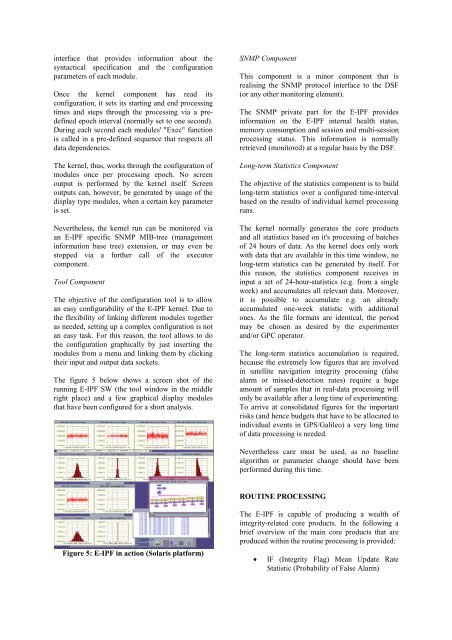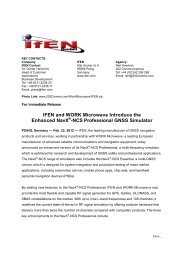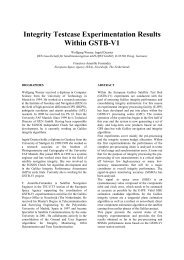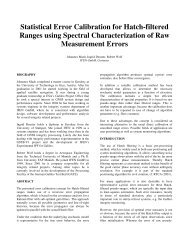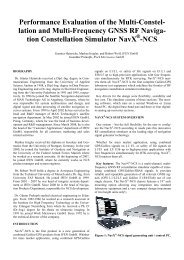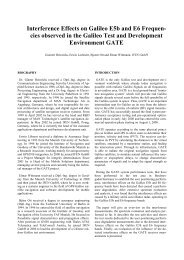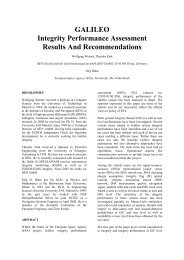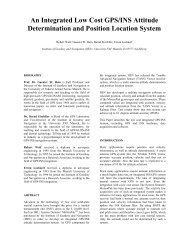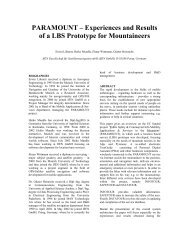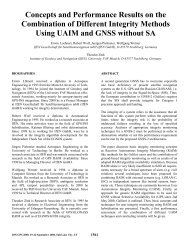Full Paper - IFEN
Full Paper - IFEN
Full Paper - IFEN
- TAGS
- paper
- ifen
- www.ifen.com
Create successful ePaper yourself
Turn your PDF publications into a flip-book with our unique Google optimized e-Paper software.
interface that provides information about the<br />
syntactical specification and the configuration<br />
parameters of each module.<br />
Once the kernel component has read its<br />
configuration, it sets its starting and end processing<br />
times and steps through the processing via a predefined<br />
epoch interval (normally set to one second).<br />
During each second each modules' "Exec" function<br />
is called in a pre-defined sequence that respects all<br />
data dependencies.<br />
The kernel, thus, works through the configuration of<br />
modules once per processing epoch. No screen<br />
output is performed by the kernel itself. Screen<br />
outputs can, however, be generated by usage of the<br />
display type modules, when a certain key parameter<br />
is set.<br />
Nevertheless, the kernel run can be monitored via<br />
an E-IPF specific SNMP MIB-tree (management<br />
information base tree) extension, or may even be<br />
stopped via a further call of the executor<br />
component.<br />
Tool Component<br />
The objective of the configuration tool is to allow<br />
an easy configurability of the E-IPF kernel. Due to<br />
the flexibility of linking different modules together<br />
as needed, setting up a complex configuration is not<br />
an easy task. For this reason, the tool allows to do<br />
the configuration graphically by just inserting the<br />
modules from a menu and linking them by clicking<br />
their input and output data sockets.<br />
The figure 5 below shows a screen shot of the<br />
running E-IPF SW (the tool window in the middle<br />
right place) and a few graphical display modules<br />
that have been configured for a short analysis.<br />
Figure 5: E-IPF in action (Solaris platform)<br />
SNMP Component<br />
This component is a minor component that is<br />
realising the SNMP protocol interface to the DSF<br />
(or any other monitoring element).<br />
The SNMP private part for the E-IPF provides<br />
information on the E-IPF internal health status,<br />
memory consumption and session and multi-session<br />
processing status. This information is normally<br />
retrieved (monitored) at a regular basis by the DSF.<br />
Long-term Statistics Component<br />
The objective of the statistics component is to build<br />
long-term statistics over a configured time-interval<br />
based on the results of individual kernel processing<br />
runs.<br />
The kernel normally generates the core products<br />
and all statistics based on it's processing of batches<br />
of 24 hours of data. As the kernel does only work<br />
with data that are available in this time window, no<br />
long-term statistics can be generated by itself. For<br />
this reason, the statistics component receives in<br />
input a set of 24-hour-statistics (e.g. from a single<br />
week) and accumulates all relevant data. Moreover,<br />
it is possible to accumulate e.g. an already<br />
accumulated one-week statistic with additional<br />
ones. As the file formats are identical, the period<br />
may be chosen as desired by the experimenter<br />
and/or GPC operator.<br />
The long-term statistics accumulation is required,<br />
because the extremely low figures that are involved<br />
in satellite navigation integrity processing (false<br />
alarm or missed-detection rates) require a huge<br />
amount of samples that in real-data processing will<br />
only be available after a long time of experimenting.<br />
To arrive at consolidated figures for the important<br />
risks (and hence budgets that have to be allocated to<br />
individual events in GPS/Galileo) a very long time<br />
of data processing is needed.<br />
Nevertheless care must be used, as no baseline<br />
algorithm or parameter change should have been<br />
performed during this time.<br />
ROUTINE PROCESSING<br />
The E-IPF is capable of producing a wealth of<br />
integrity-related core products. In the following a<br />
brief overview of the main core products that are<br />
produced within the routine processing is provided:<br />
• IF (Integrity Flag) Mean Update Rate<br />
Statistic (Probability of False Alarm)


